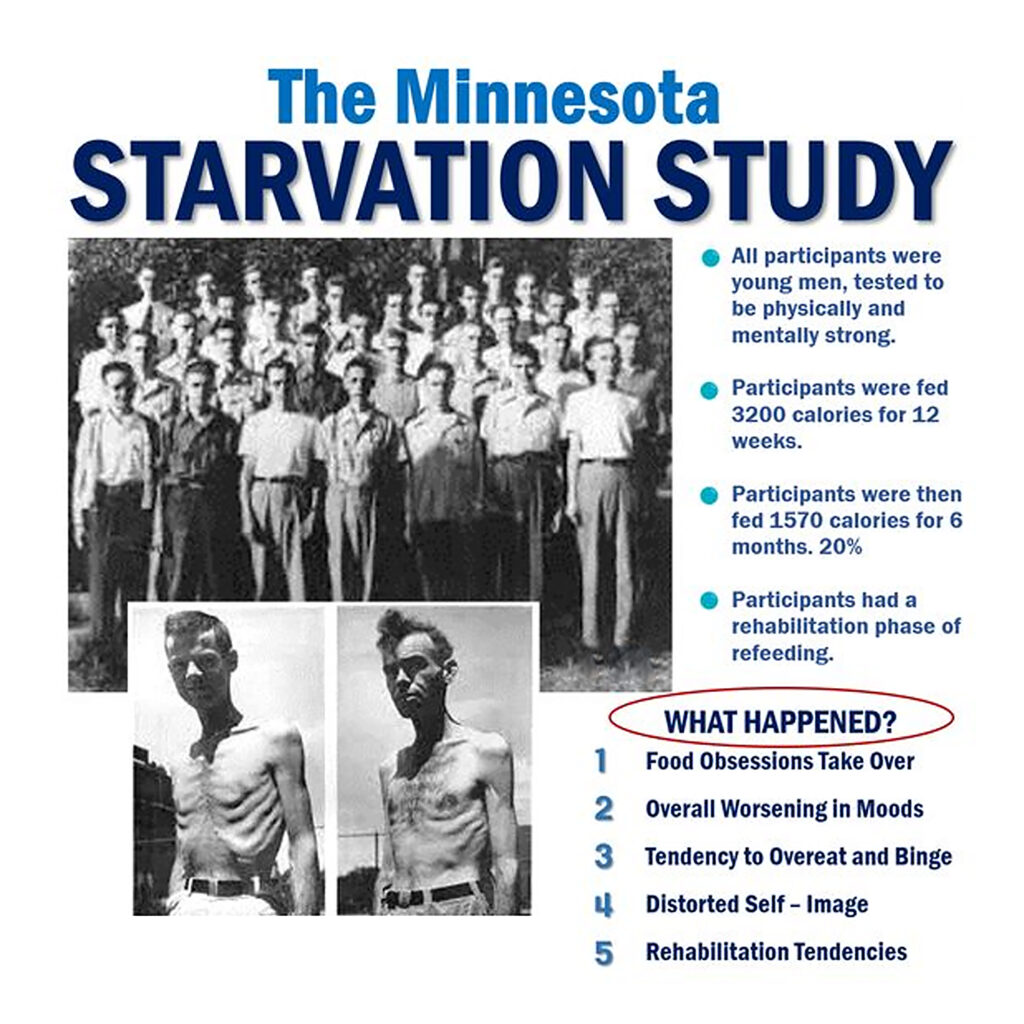Have you ever wondered why losing weight feels like climbing Everest for some and a Sunday stroll for others? It turns out there’s more to the story than merely cutting calories and hitting the gym. Let’s unravel why dropping pounds isn’t always as simple as it seems.
The Irony of Weight Loss
Don’t you think? Isn’t it ironic how the food that kept us alive now makes weight loss a tricky challenge? Back in the day, when food was scarce, our bodies were designed to store fat for survival. This ability to acquire fat was a lifesaver during times of famine. But in today’s world, where food is everywhere, this same mechanism works against us. Our bodies are still wired to hold onto fat and, making it harder to shed those extra pounds. We were built for survival in the past, but now we face the effects of living in a world of abundance. Understanding our body’s survival mechanisms can help us take a more thoughtful and lasting approach to achieving our goals.
Understanding the Physiology Behind Diet Failures
The weight loss journey can be frustrating. We’ve all heard it before just burn more calories than you eat, and your weight will start to drop. But it’s definitely more than just eating less and moving more. A significant part of this struggle lies in our body’s physiological responses to calorie restriction. You think of your body as a super-complex machine where many factors influence weight management:
Drop in Basal Metabolic Rate (BMR):
When we cut calories, our basal metabolic rate decreases. This adaptation helps our bodies conserve energy, making it more challenging to continue losing weight over time.
Move It or Lose It:
Your daily activity level outside the regular exercise plays a big role. So, if you feel like doing nothing and sitting all day after an intense workout session of two hours, this is not all for you. In fact, studies show that reduced caloric intake often leads to decreased physical activity or N.E.A.T (non-exercise activity thermogenesis). As our bodies naturally preserve energy when we lose weight, we often find ourselves moving less. This not only reduces our energy expenditure but also encourages fat storage.
Hunger Games:
It’s not just about resisting that donut; your hunger signals and appetite are influenced by more than just willpower. Hormones like ghrelin and leptin play their own roles in deciding when you feel hungry or full, making it feel like you’re in a never-ending battle. Sometimes, no matter how much you eat, your body tells you it’s not enough. This is known as the “starvation response to calorie deficit and weight loss.”
A classic example of this comes from the Minnesota Semi-Starvation Study, conducted in the mid-20th century. In a six-month study, lean male participants were given only half of their needed calories while walking 5-6 miles daily. By the end of the study, their body fat dropped to around 5%. After being allowed to eat normally again, they quickly regained fat and even exceeded their original body fat levels. Because of the drop in leptin and high ghrelin, the increased hunger and cravings drive us to eat more food, often resulting in regaining weight—sometimes even exceeding it.

By understanding these physiological responses, we can better navigate the complexities of weight loss.
Your Tribe Defines Your Life:
We are living in an obesogenic environment, where highly palatable caloric-dense food is available in abundance, and technology has given us an extra excuse to limit physical activity whenever convenient. In an environment like that, trying to lose pounds feels like an uphill battle. It is important to realize that willpower and determination are also limited resources that can only last for so long. It is important to pay attention to your surroundings rather than relying only on your dedication.
Genetics:
Genes are key players in your weight loss journey. If obesity runs in your family or you face certain challenges growing up, here’s the truth: you might have a tougher road ahead. Research shows that if your family has a history of obesity, you’re more likely to face similar struggles. You can’t compare your weight loss journey to someone who loses weight effortlessly. So, it’s not about how much an individual puts effort into it because there’s a lot going on behind the scenes.
Health Education:
The obesity epidemic has come to be a societal challenge, not just a personal one. Now, it’s essential that governments step up and provide access to health education and awareness so people can make informed choices for a healthier lifestyle. Studies have shown a significant impact of education on blood pressure and obesity could be one of the major approaches to reducing the prevalence of obesity, hypertension, and other obesity-related diseases.
Financial Constraints:
The ever-so-high inflation and financial constraints can also affect how easy or hard it is to manage your weight. While the unhealthy food is cheap healthy options are treated as luxury and financial strain can limit access to healthy food and fitness options, making it harder to stay on track.
My Advice is to “Find Strength in Your Story”:
The weight loss journey is unique for everybody. Not everyone faces the same challenges and rewards on their journey to better health, and that’s perfectly okay. If you’re navigating a different path, I encourage you to use the set of cards you deal with; instead of worrying about the “cards” you cannot control, embrace acceptance and then adapt. Be part of the supportive communities around that provide honest communication, credible Advice, and shared goals. The road may be bumpy, but you will find strength in your story by recognizing and sharing your experiences.
The Bottom Line
Losing weight might not be easy, but understanding the bigger picture makes it a bit less challenging. It’s not just about the number on the scale; it’s about empathizing with your struggles, making healthier choices, and celebrating small wins along the way.



